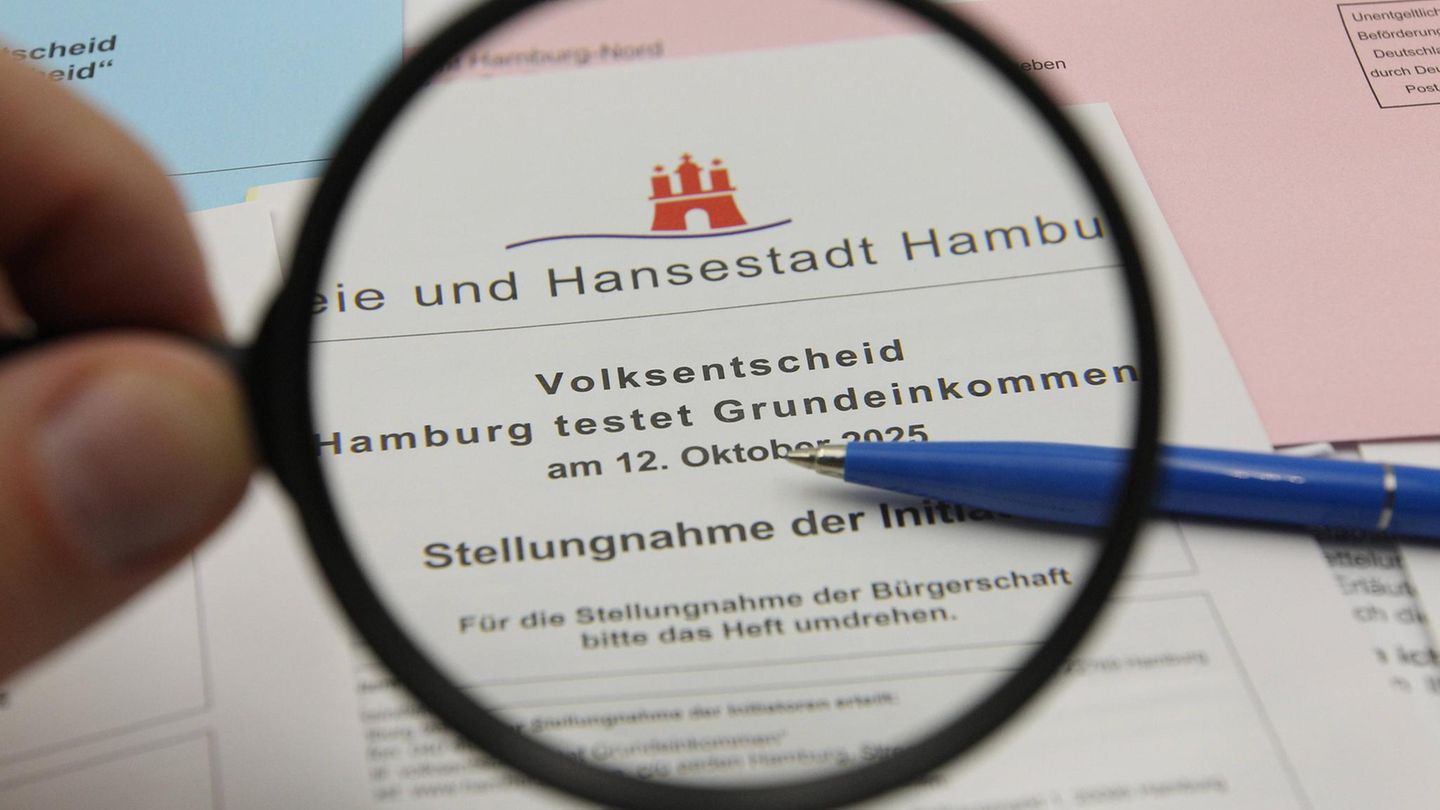Hamburg before referendum
1346 euros of basic income – how is that supposed to work?
Copy the current link
Add to the memorial list
Hamburg consumes a model test for basic income. The goal is the end of child poverty and social descent. Would that be effective and also possible throughout Germany?
Accept the dream job, even if it is poorly paid, no longer have to go begging, give children a good life: all of this and more should enable unconditional basic income (BGE). The idea: every citizen regularly receives a certain amount of money from the state without having to provide a consideration or to demonstrate need.
Hamburg’s citizens can vote on this on Sunday (October 12). It is about a first state pilot test for the introduction of an unconditional basic income. The popular initiative “Hamburg tests basic income” provides its concerns in a referendum.
What is an unconditional basic income anyway?
According to the definition of the initiators, the unconditional basic income is a tax -free amount of money that is paid out every month from birth from birth. “Just like that” – and regardless of obligations, need, income and assets.
The idea behind it: Everyone has enough to live and can participate in social life. Existing social benefits that meet the same purpose of participation could then be omitted – such as citizenship, social assistance, BAföG, housing benefit and child benefit.
What is the referendum?
From the perspective of the popular initiative “Hamburg tests basic income”, a basic income would be a big step into a fairer, more solidary society and accordingly protection for democracy. “People can develop with a basic income, regardless of origin and account balance.”
So far it has not been the case. In Hamburg alone, 27.8 percent of those under 18 are threatened by poverty, 43 percent of single parents are at risk of poverty-although many worked. In addition, 40 percent of the jobs are temporary work, temporary or mini jobs.
It is already the second attempt by the initiative to introduce a model test for an unconditional basic income. At the beginning of 2020, the initiators had already collected the necessary number of 10,000 valid signatures.
A subsequent referendum was stopped in the summer of 2023 by the Hamburg Constitutional Court at the request of the red-green Senate. The initiators then revised their draft law and started the new initiative.
What should be done specifically?
The initiators have submitted a bill. According to this, 2000 of the Hamburgers, who are representative of 2000, should receive a basic income for over three years. This year this would be 1346 euros per month plus health insurance.
The amount increases annually in the amount of the inflation rate. However, own income would be taken into account. As a rule of thumb: “The lower your own income, the higher the basic income paid out.” The initiators emphasize that a total of 83 percent of the population could benefit from the basic income.
Who should pay for that?
“If the model test takes place from 2027, we expect costs of around 50 million euros for the city of Hamburg,” the initiators explain. Around 42 million euros of this are earmarked for the basic income payments and around eight million euros for the preparation and accompanying research.
The cost limit in the draft law is 0.227 percent of the total expenditure of the latest, decided budget year when the law comes into force. This corresponds to around 50.8 million euros for the calendar year 2026.
Would an unconditional basic income be possible across Germany?
A nationwide, existential basic income would be technically implementable, but would require an enormous social, political and economic change – and above all cost a lot of money.
Current studies put the costs of a basic income from a existence at around 1200 euros per adult per adult and 600 euros per child. The approximately 1100 billion euros would cost annually, which corresponds to about a quarter of the gross domestic product.
To compensate, social benefits such as citizen benefit, social assistance, BAföG, housing benefit or child surcharge could be omitted, but this would only save around 100 billion euros a year. There would be a net load of around one trillion euro – this could only be compensated for by massive tax increases or a profound tax reform.
The financing and the concrete design of a BGE strongly depend on political decisions. Some models provide for a system change to tax and social policy, for example according to the “Ulm model” or the concept of “solidarity civil allowance”.
Legally, the introduction would be associated with extensive changes in the law and should also be based on European regulations and principles, such as the principle of subsidiarity.
Why model test?
The aim is to test the basic income in a scientific procedure. “The Hamburg model experiment opens up the chance to learn how a basic income must be to meet expectations – including future generations – to a fair, affordable and strong welfare state,” explains the emeritus economy professor and founding director of the Hamburg World Economic Institute, Prof. Thomas Straubhaar.
Is there criticism?
Yes, among other things, the Hans-Böckler Foundation, which is close to the employee, advises against a tax-financed basic income. Among other things, their researchers see the risk of a Trojan horse by serving the costs as an argument for painting all transfer payments, including pension.
The basic income also had a significant impact on the wage structure, since employers would completely give away from the obligation to pay existence wages. The result: in the end there would be a “super comede with a high state share and a low employer share”. From the point of view of the foundation researchers, it would make more sense to promote the training, family or business foundation through generous transfers.
Some economists and reports also warn of negative labor market effects and a burden on state finances. High border tax rates to enable financing could reduce incentives on the one hand and weaken international competitiveness. On the other hand, pilot projects and some model studies speak for people who would continue to participate in the labor market despite the basic income.
What do the citizens’ factions say?
Apart from the left, all political groups are against basic income. The SPD and the Greens consider the model to be far too expensive, it also does not provide scientific added value because there have already been model experiments elsewhere. In addition, the basic income is not unconditional because income would be counted.
For the CDU, the referendum “provides a costly, uncomfortable project to vote that raises more questions than answered”. The AfD ends its recommendation for a no to basic income with a simple “their taxes – their decision”.
How does the referendum work?
If the Hamburgers have not already used their postal voting rights, according to the state election office on Sunday between 8 a.m. and 6 p.m. The counting of the votes is still in the evening.
From the initiative’s point of view, the referendum is considered obtained if, on the one hand, at least one fifth of the approximately 1.3 million voting persons voted and on the other hand there are more yes than no votes. If the initiative does this, the Senate and Citizenship must implement the model test.
It is the first vote in which the Hamburgers can decide on a question of facts since the failed Olympic Ferendum 2015, which was initiated by the Senate. The last referendum that referred to a successful popular initiative was that to buy back the 2013 energy laws.
The initiators of “Hamburg tested basic income” originally wanted to prevent the vote together with the Bundestag election actually planned for September. However, the election of the early government in Berlin had been brought up to February, so that the referendum is now held without a “correct” choice.
With material from the dpa news agency
Source: Stern




